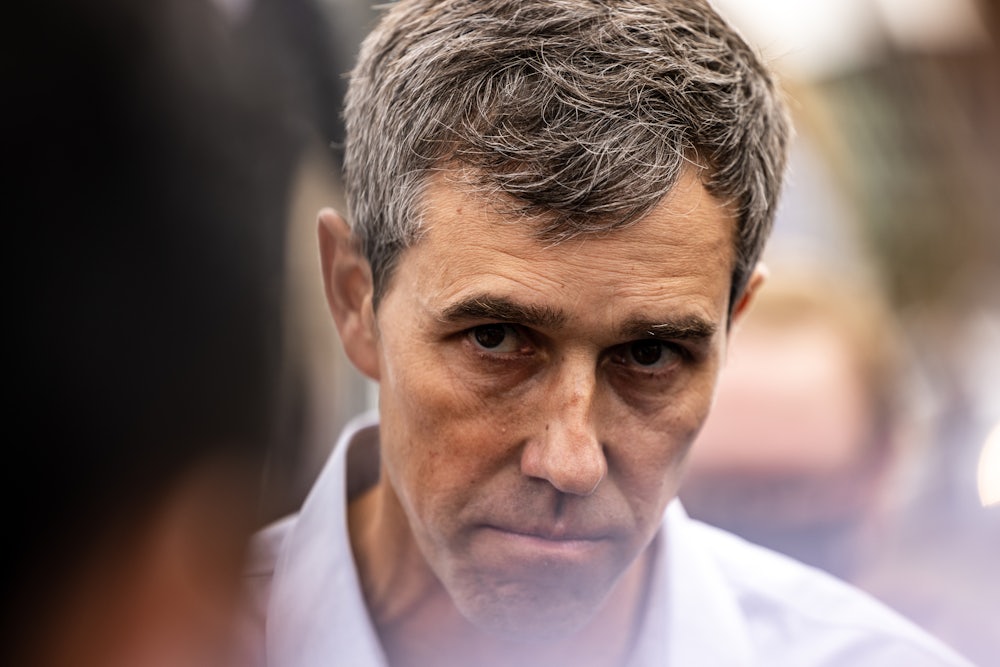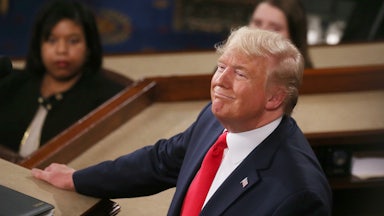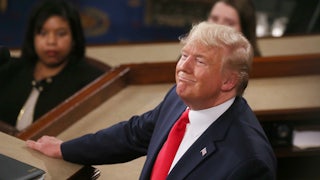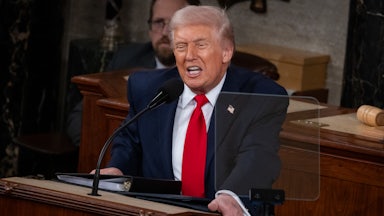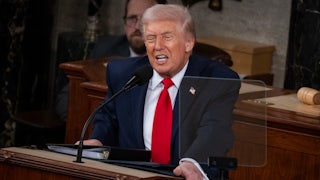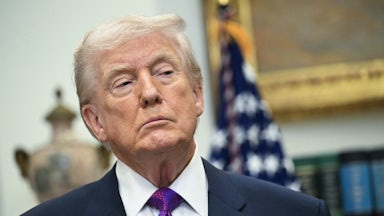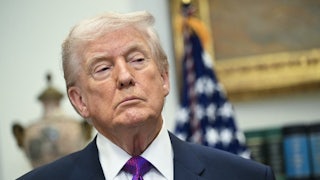Beto O’Rourke maintains this time is completely different. This time, the former congressman is running for governor in Texas, challenging Republican incumbent Greg Abbott. The circumstances are dramatically changed from 2018, when he last ran for statewide office, he said in an interview with The New Republic on Tuesday. Covid-19 is still rampant, voting rights are more urgently in need of protecting, and Abbott’s governance has created an opening for the former congressman.
Right now, Texans realize “that we are so deeply divided, and those divisions are exacerbated every day by the current governor, who is pitting us against each other on middle school girls’ athletics or this abortion ban that sets a $10,000 bounty on women or these carry laws [that] allow anyone to carry a loaded firearm in public without a background check or training,” O’Rourke said. “We want to get past this stuff and get back to the big things that we really care about and we dream about.”
O’Rourke announced Monday that he’ll challenge Abbott, a two-term incumbent seeking term number three. Abbott’s victory margin decreased from 2014 to 2018, and in 2020, Joe Biden raised Democratic hopes about the party’s future in the state by coming within five points of Donald Trump.
The flip side of that, though, is that O’Rourke has two losses under his belt now—a narrow loss to Ted Cruz in that 2018 Senate race and a far more decisive failure to gain traction in the 2020 presidential race. But O’Rourke is no longer a novel curiosity. He’s now the front-runner and likely nominee to face Abbott after potentially divisive Republican and Democratic primaries. Abbott will face hard-right bomb-thrower and former Congressman Allen West, while on the Democratic side, three candidates have declared so far.
O’Rourke’s bid comes in a difficult cycle for Democrats. The most recent gubernatorial elections were expected to be clean wins for former Governor Terry McAuliffe in Virginia and incumbent Governor Phil Murphy in New Jersey. Instead, McAuliffe lost and Murphy narrowly won.
O’Rourke declined to hypothesize what those races heralded for Democrats in the midterm, saying essentially that he was focused on Texas. But he did say Democrats needed to do more than villainize their opponents. That’s clearly something of a knock on McAuliffe, who relentlessly bashed his opponent, now Governor-elect Glenn Youngkin, as a Donald Trump acolyte. McAuliffe derisively called his opponent “Glenn Trumpkin” at times.
“From what little I can pick up [from those races], you gotta be talking to the voters who will be deciding the outcomes of these elections,” O’Rourke said. “And you’ve gotta be listening to them, and you’ve got to be meeting them where they’re at in their communities. At the end of the day, you have to leave them with a vision of how their lives are going to be better with you in office. Not how bad the other guy is. Not the things that scare us but the things that we aspire to.”
Again and again in our conversation, though, O’Rourke attacked Abbott. He pointed to “the really extremist, divisive bills that the governor has signed into law around guns, around abortion, around targeting transgender students.” Over the last year, O’Rourke said, Texans have also seen “a massive failure of our power grid that knocked the lights out and turned the heat off of millions of people in his state.” He also called Texas’s response to Covid-19 under Abbott’s leadership “completely incompetent.” Abbott, O’Rourke said, was not listening to the constituents he’s supposed to represent.
When asked if he was practicing what he preached, O’Rourke said: “It’s critical that people understand the contrast and the consequence and cost of Greg Abbott being in office.”
The larger issue for O’Rourke, and Democrats in general, is surpassing Republican turnout in the midterms. Democrats have privately been fretting that Republican energy is high this cycle while Democratic enthusiasm is depressed. Last week the Democratic Governors Association held a debriefing for campaign operatives and consultants on the results in the Virginia governor’s race, according to two Democrats with knowledge of that meeting. The debriefing’s findings included that Virginia Democrats and the McAuliffe campaign hit all their turnout marks, but Republican turnout simply beat “anyone’s wildest expectations,” according to one of the Democrats with knowledge of the debriefing.
Even though it’s a long shot for O’Rourke, the Texas gubernatorial race is likely to be one of the more high-profile contests of 2022. The Washington Post pointed out that Abbott has more than $50 million in his campaign account and O’Rourke is a proven megafundraiser.
When O’Rourke ran for Senate against Cruz, he was able to juice turnout and support both nationally and within the state. But that still wasn’t enough. Cruz dominated all across rural Texas and the northern part of the state. This time around, O’Rourke said, “I’m going to make sure in these northern counties, these western counties, these eastern counties … and the panhandle to boot, that we make clear the contrast.” For example, he said, “In the seven years that Greg Abbott has been in office, at least 20 rural hospitals have had to shut their doors.”
To win, O’Rourke will have to appeal to more than Texas Democrats. He’ll have to win over Texas independents and some Republicans. He will have to replicate his success in urban centers in the state but also switch some neighboring counties from Republican to Democrat. O’Rourke was frankly clobbered by Cruz in the entire central and northern part of Texas. He’ll need to be more competitive in counties like Tom Green, Taylor, Van Zandt, and Henderson, all of which Cruz dominated. He’ll also have to stop the bleeding along the Rio Grande that could further hinder his competitiveness in a general election matchup (it’s unclear if a strong third-party candidate like, potentially, actor Matthew McConaughey, will emerge to further complicate this campaign).
This cycle, Abbott has already had to defend his right flank from multiple conservative primary challengers, West most notably. This helps explain the highly restrictive abortion laws Abbott passed and a general eagerness to come off as extremely conservative on every issue. Abbott will certainly win, but the multicandidate primary will keep the always wary Abbott focused on appealing to the GOP’s conservative base.
O’Rourke oftentimes leans heavily on his signature soaring rhetoric and effusive optimism. But he also was realistic about the likelihood of the makeup of the state legislature in the best-case scenario if he won the governorship. He said he still expected Republicans to control the state legislature and therefore limit what he as governor would be able to pass.
“I don’t know that if elected governor and with a likely Republican-majority legislature that we would be able to pass universal health care in the state of Texas,” O’Rourke said. “It is my aspiration, it is the greatest good that we can do for this state, to make sure everyone can see a doctor. But I think what is both ambitious and achievable is expanding Medicaid, which allows more than a million more Texans to actually see a doctor, many for the first time. It would bring tens of millions of dollars into the state [and] significantly reduce the tax burden for Texans.”
He sees some hope for reversing the state’s regressive direction on voting rights. “I am sure that we can find common ground to guarantee free and fair elections in Texas,” O’Rourke said. “For example, there’s been some movement toward allowing Texas voters to update their voter registration online. Now, that doesn’t sound like much to you, probably. But that’s light-years ahead of where we were on that issue and probably gets us closer to being able to register to vote online, which as you know, you can do in most states. From there, I think we look at automatic voter registration and same-day voter registration.”
Indeed in his interview with TNR and other outlets, O’Rourke pointed to voting rights as a driving issue for his campaign. He’s said President Biden needs to focus more on it.
O’Rourke said he wanted to make the case to his Republican colleagues that “this is not about the advantage of one party over the other. This is making sure that your constituents and the voters and the communities that you represent have equal access to the ballot box. There’s nothing more American, and I hope nothing more Texan, than doing that, given how many people from this state have put their lives on the line, lost their lives fighting for and in defense of this democracy. So I do think we can make progress on that.”
O’Rourke is undeniably the underdog in a general election matchup against Abbott. Polling shows Abbott leading O’Rourke from as few as nine percentage points (which is good for a Democrat in Texas) to as many as 12 percentage points. Starting in the 1870s, Democrats controlled the Texas governor’s mansion for nearly 100 years straight. Since then, though, the trend has favored Republicans. Ann Richards, who served as governor from 1991 to 1995, was the last Democratic Texas governor.
It hasn’t been for lack of trying. Democratic hopes of winning a major statewide election in Texas and beginning to turn the state blue have persisted in recent years. In 2014, Wendy Davis represented that in her unsuccessful bid for governor. In 2018, the mantle fell to O’Rourke. In 2020, Democrats hoped M.J. Hegar could win them a U.S. Senate seat by ousting Texas Senator John Cornyn, a member of Republican leadership.
Each time, hopes were dashed.
O’Rourke, once again, is looking to end a grim trend for his party—and for him. The race is already likely to be one of the more expensive ones in the country. He’ll need to raise those millions to win more than urban areas and appeal to a broader electorate across the state beyond the sort of southern crescent he carried in 2018. It’s a tall order. When O’Rourke told Vanity Fair he was “born to be in it” at the beginning of his erstwhile presidential campaign, he seemed to signal he was born for tough fights. He’s once again in one.
